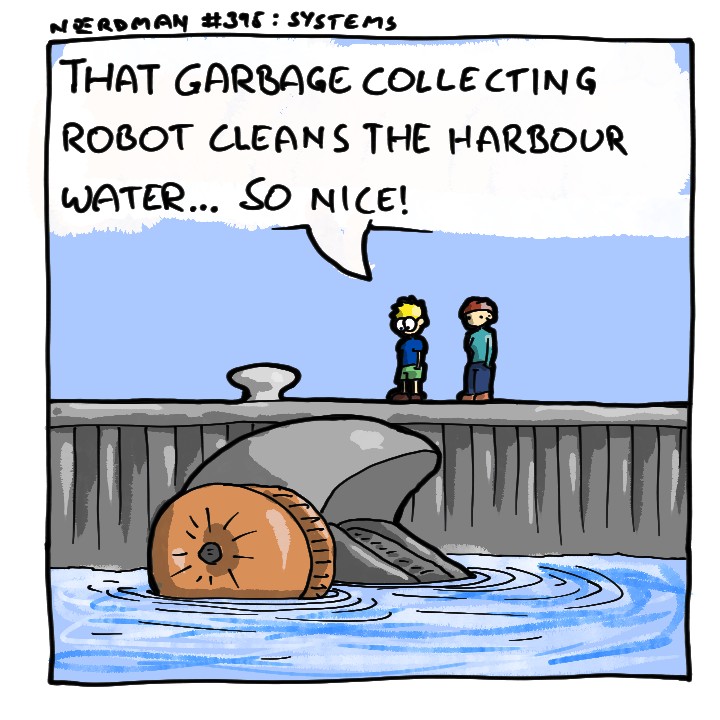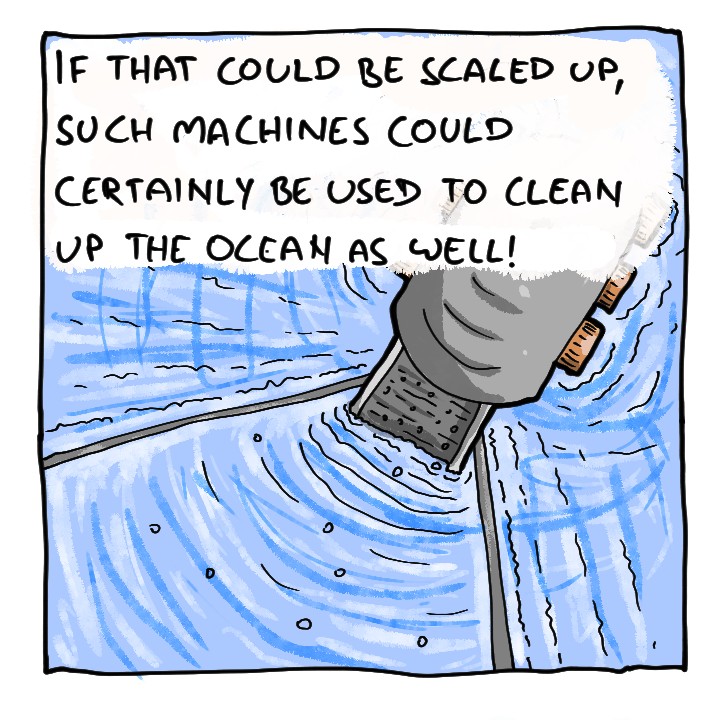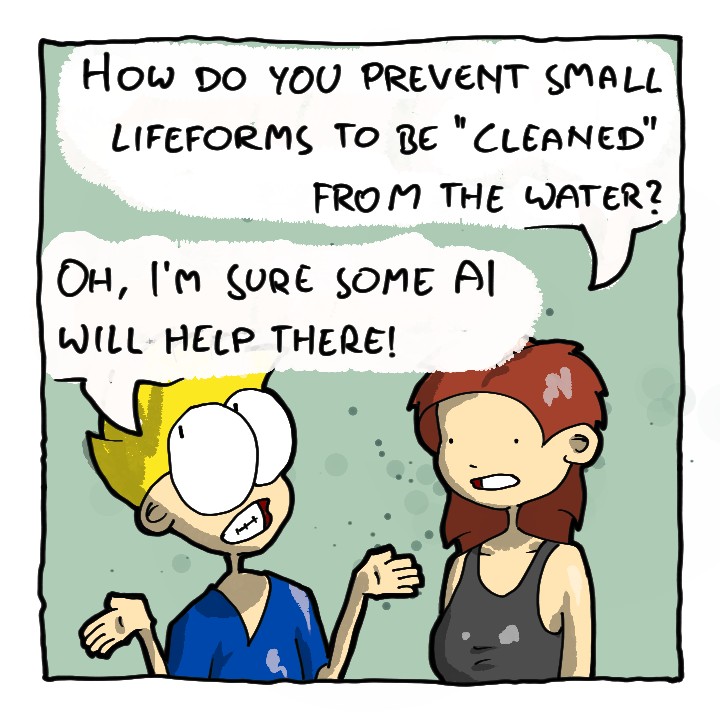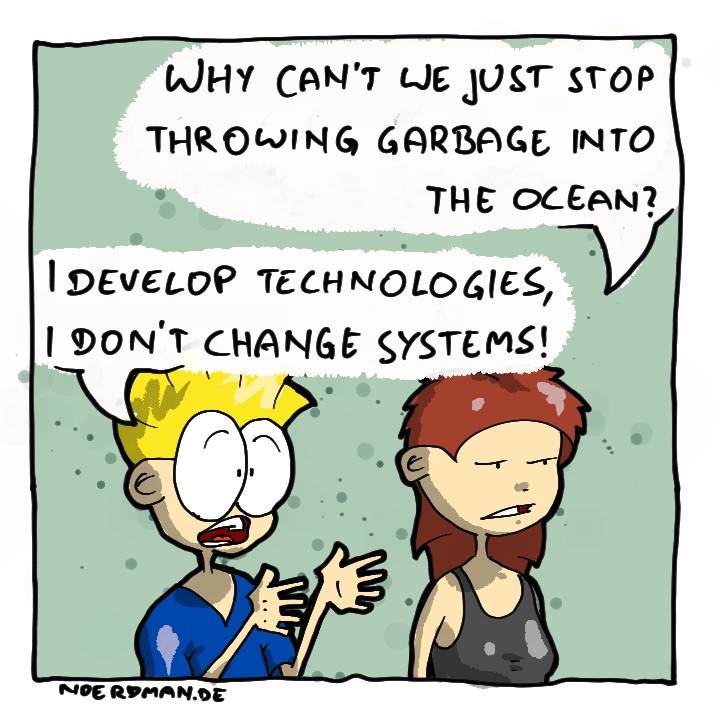- cross-posted to:
- fuck_ai@lemmy.world
At some point after we have reduced pollution significantly, we’re gonna have to clean up all the trash we already put out there. Microorganisms can regrow, but plastic can’t, so we just need to find the maximum collection speed that the environment can sustain.
I mean, yeah. People who develop technologies don’t change the systems, and it’s very, very wrong if we ask them to. If you rely on technology company to come up with the system, hyperloop happens. Don’t let another hyperloop happen, don’t come to technology company for the change of the system.
Hyperloop was a delibarate diversion tactic by a car company owner to kill discussion about an actually realistic train project
And that’s only one of the many reasons technocompanies should stay in their lane, and shouldn’t be asked to be involved in policy decisions.
This is definitely true of “AI”. Lots of grifters exacerbating and profiting from existing problems.
But in fairness this is true of like 99% of capitalism.
Mr. Trash Wheel has done great things for the Baltimore harbor. What happens is the Jones Falls River gets a lot of runoff during rainstorms, and trash washes into it, which ends up to the harbor. Mr. Trash Wheel sits at the mouth of the river, where it meets the harbor and has collected over 1500 tons of trash since it was installed back in 2014.
Trash wheels aren’t a solution to the problem, but they are a useful tool in helping to fight climate change and protecting local ecosystems.
fight climate change
What does ocean plastic have to do with climate change? Am I missing something?
Apparently it does:
Marine organisms, such as plankton, fish, and larger mammals, are integral to the ocean’s carbon cycle. These organisms help sequester CO2 through a process known as the biological carbon pump, where CO2 absorbed during photosynthesis is transported to deeper waters when these organisms die and sink. However, when these organisms ingest microplastics, their ability to perform this function is compromised, reducing the ocean’s capacity to absorb CO2.
Moreover, plastics can alter the chemical composition of seawater, increasing its acidity and affecting marine ecosystems like coral reefs and shellfish, which are crucial for carbon sequestration. As these ecosystems degrade, the ocean’s ability to mitigate climate change diminishes.
Adding components to a system alters the output therefore changing the system.
If large complex lifeforms and ecosystems began to evolve to live on the Great Pacific Garbage Patch, would it be immoral to remove/clean the garbage patch?
As immoral as creating it was.
The immorality is habitat destruction and negligently killing.
The garbage patch isn’t intrinsically bad, beyond being ugly, which is an aesthetic rather than moral judgement. It’s bad because of the impact it has in the life around it. If life has adapted to live on it it’s no longer purely damaging. If they adapt such that more benefit than are harmed then cleanup would be more damaging than beneficial.A real example is the USS Arizona. If we were given the choice, we shouldn’t have sunk a massive battleship with 1.5 million gallons of oil onboard.
Now though, it’s become a coral reef and is full of life that would be destroyed if we removed the ship (to say nothing of the risk of spilling the remaining 500,000 gallons of oil).Nothing is ecologically dependent on the garbage patch though, and it’s most likely to remain that way for the foreseeable future, so it’s a moot point in the end.
For that to happen it would take an extremely long period of time. Like think about how long humans have been around. We probably wouldn’t necessarily be around to see it. So while we’re here we should try to fix it.
“Adapt” would probably be more appropriate here instead of “evolve”.
Life makes the best of what is thrown at it, but I think we should always try to clean up our messes.
Developing technologies means mitigating negative externalities. You don’t just design a pressure cooker and ignore the possibility it might explode because you “can’t force people to not leave it unattended”, you spend the extra time and money to design and install a safety valve.
Tools help problems, but not all risks should be on the manufacturer. If they hurt the environment, sure it is their fault, but people end up weighing is it better for the environment overall. The trash wheels in rivers were.
No one is reasonable to say a kitchen knife manufacturer should be liable for people cutting their fingers off while cooking. Could someone design safer knives, of course.
Make the polluters pay fines/taxes and use the money to improve the cleaning robot
Ending the behavior doesn’t clean up the problem.
AI is sounding more and more like Maxwell’s Demon
¿Por qué no los dos?
Can’t fish just swim out? I don’t think there’s a net under the water.
There is a net, but it’s shallow, allowing the fish to swim underneath, while trapping most plastics, which generally float.
They can, it’s harmless to the wildlife.
Actual answer: Mr Trash Wheel runs so slowly that fish, ducks and crabs can move out of the way.
This doesn’t prevent stuff like plankton from being “cleaned” too, and I feel that would cause ecosystem issues
Plankton is microscopic!!!
Read the link I posted.
The smallest Mr Trash Wheel can collect is a cigarette butt.
Not having known anything about this device, I wondered the same question. When someone talks about “cleaning oceans” my brain goes to the massive issue of “microplastic pollution.” Is there an answer out there for filtering microplastics without screwing up the plankton, krill, and other tiny lifeforms that make up the base of the oceanic foodchain? I have no idea.
Following the link above, the device in question appears to be focused on larger trash pieces than I was imagining. It doesn’t seem to filter tiny particulates at all.
So there’s two lines of thought here: 1) tiny organisms are probably surviving through this device. But also, 2) it only removes bulk trash (which is important in its own right and prevents larger plastic from breaking down in the water futher, but it cannot remove existing microplastics.)
We’d still need to figure out something that can remove microplastics without harming microorganisms if we want to really tackle ocean pollution. So much life in the ocean depends on a healthy population of such creatures, that I’m struggling to understand why so many people have downvoted your valid concern. Removing large trash is good, but if the goal is “clean oceans,” it’s far from enough. There’s so much more trash that we can’t even see because it’s microscopic. But it fucks with ocean life throughout the food chain and shouldn’t be ignored.
Anyway, thank you for considering the “bigger picture.” It doesn’t look like many people are seeing this issue from the same angle, and too many would rather downvote comments they don’t understand than attempt to bridge the misunderstanding.
I think the downvotes are due to the “perfect is the enemy of good” argument they inadvertently make. I.e. because it’s not also collecting micro plastics, it’s not worth doing. It’s likely not intentional, but it’s a rapid killer of good, new ideas.
As for the micro plastics issue. The only viable way is to design/breed an organism (or organisms) that can consume and digest the plastics. A genetically modified krill might be able to do it, if not, bacteria.
It’s a massive challenge however. Not least proving that it’s safe. Once it’s loose in the oceans, putting that genie back in the bottle will be difficult.
At least dealing with some portion of the problem is a good start and we’re still inventing new methods of dealing with microplastics, so until nearly all the trash is gathered larger trash cleanup efforts are worthwhile. Apparently 92% of the mass is made up of larger objects, so these need addressed first anyways.
At least dealing with some portion of the problem is a good start
larger trash cleanup efforts are worthwhile.
I’m confused, where did I say anything to imply otherwise? I stated that this particular device doesn’t filter microplastics, as well as that microplastics are a huge problem that needs to be addressed. Which part of that implies that larger garbage pieces aren’t worth cleaning up? After all, larger pollution breaks down to produce smaller pollution (which I also stated.) Denying large pollution while acknowledging micropollution wouldn’t make any sense, so I’m not sure where this argument is coming from.
I’m reminded of that “Twitter” meme, where someone can’t talk about pancakes without people arguing that they must hate waffles. It’s just as absurd to assume that if someone is talking about microplastics, that means they’re fine with larger garbage.
More than the huge amount of trash floating there? I feel this is missing the forest for the trees
Yes, it could be. Plankton are crucial for many marine ecosystems. Without them, some ecosystems would collapse
It’s just something that needs to be studied and accounted for











